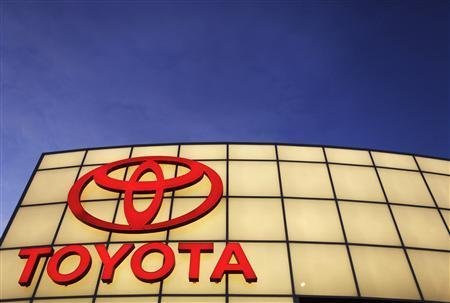Toyota says quake-hit plants escape major structural damage

After the quake, Toyota had trouble contacting it plants in the northern Japan quake zone, making it difficult to assess their condition. Two Toyota body-making subsidiaries have assembly plants in the region, while the parent company operates two parts factories there.
One of two convoys of Toyota-dispatched relief trucks reached the area on Sunday, while another arrived Monday, the company said. The convoy – comprised of six water tankers, two fuel tankers and nine cargo trucks – delivered supplies to the factories' communities. Among the emergency goods: water, food, blankets and portable toilets.
"We don't have any reports of injuries. There were no deaths, and everybody's safe," spokesman Paul Nolasco said of the company's employees in the disaster area. Other details weren't immediately available.
All of those northern facilities have been shut down since the earthquake, which was recently upgraded to a magnitude of 9.0, struck off Japan's northeastern coast Friday – collapsing buildings, buckling roads, triggering landslides and unleashing a series of deadly tsunamis.
The two assembly plants include one run by Central Motors Co. in Miyagi prefecture and another operated by Kanto Auto Works Ltd., in neighboring Iwate prefecture.
The Central Motors plant, which just opened in January, suffered damage to its wall and some pipes but had no major structural or equipment problems, Toyota said Tuesday. The Kanto Auto plant had some of its stamping machines displaced by the quake's shaking.
The Central Motors plant makes the Yaris small car. Kanto Auto makes the Yaris sedan, as well as the Scion XB and Scion XD for the U.S. market. Toyota's parts plants were not badly damaged, the company said.
But the temblor did damage a battery-making line at a plant operated by Primearth EV Energy Co., a joint venture between Toyota and Panasonic. That factory, filled with sensitive high-tech equipment, makes nickel-metal hydride batteries for various Toyota gasoline-electric hybrids.
It was still unclear how much repair work is needed or when the plants would come online.
Other Toyota plants throughout the country were in operating condition, including another nickel-metal hydride battery factory run by Primearth EV Energy in central Japan.
But Toyota has suspended all 28 manufacturing sites nationwide, at the parent company and its seven affiliates, through at least Wednesday amid parts shortages and power shutdowns.
Related News


